December 9, 2015
UFCW Hosts Workers’ Rights Training Session for Poultry Workers
[aesop_quote type=”pull” background=”#282828″ text=”#ffffff” align=”center” size=”2″ quote=” I am not afraid. I know we can work together to change our workplace and make it better for everyone.”” parallax=”on” direction=”left”]
This past Saturday, UFCW Local 1189, the UFCW Occupational Safety and Health Department and the Greater Minnesota Workers’ Center hosted a workers’ rights training session for unorganized poultry workers in St. Cloud, Minn. The training was focused on giving unorganized workers tools to stand up for a safe workplaces and helping them build common ground with workers of different cultural backgrounds. More than 70 workers from a variety of plants came out for the training, which was simultaneously conducted in English, Spanish and Somali.
“I am really glad I came to this training with the Somali people,” said one Spanish-speaking worker during the comment portion of the training. “I tried to get my friends to come with me but they were too afraid. I am not afraid. I know we can work together to change our workplace and make it better for everyone.”
August 13, 2015
UFCW Local 23 Helps Pass Paid Sick Leave Law in Pittsburgh
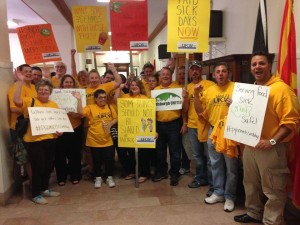 Last week, Pittsburgh passed a law that guarantees paid sick days for every worker in the city.
Last week, Pittsburgh passed a law that guarantees paid sick days for every worker in the city.
The victory was made possible by UFCW Local 23 members who spent weeks canvassing and building community support for the law.
Thanks to their hard work, more than 50,000 Pittsburgh workers will be eligible to earn paid time off so that they have the opportunity to stay home and get better when they become ill. 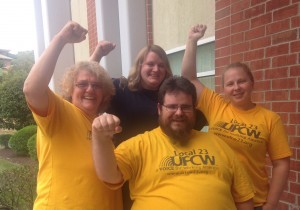
UFCW Local 23 is building on the momentum from this victory and pushing for a statewide paid sick leave law so that all workers in Pennsylvania can enjoy the same benefit.
July 8, 2015
UFCW and JBS Partner Together for Joint Safety Trainings
[aesop_quote type=”block” background=”#084e93″ text=”#ffffff” align=”center” size=”2″ quote=”It was great to see everybody working together in the setting to make our plant safer. During our walk-through, it was good to have a new set of eyes to help spot hazards that might have otherwise been overlooked.” cite=”Darin Rehnelt, representative for UFCW Local 1161″ parallax=”on” direction=”left”]
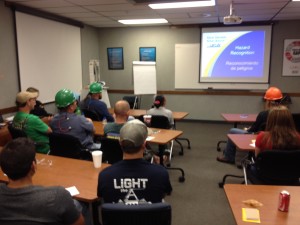 The UFCW has initiated a new health and safety program for workers in UFCW JBS plants. The program is a new joint effort with JBS to establish a uniform safety program for workers and management throughout the chain. This is the first time JBS and the UFCW have come together to create a program that is specific to keeping workers safe.
The UFCW has initiated a new health and safety program for workers in UFCW JBS plants. The program is a new joint effort with JBS to establish a uniform safety program for workers and management throughout the chain. This is the first time JBS and the UFCW have come together to create a program that is specific to keeping workers safe.
The first part of the program focuses on training union reps, workers, staff, and JBS management to learn about identifying the underlying causes of workplace injuries, illness, and fatalities. The second part trains participants on how to correct, control, and prevent those workplace hazards. The ultimate goal is to develop a sustainable system where people in the plant know how to prevent hazards, how to identify them, and how to follow the correct procedures to efficiently correct hazards.
The health and safety program came about when UFCW staff initiated a meeting with JBS corporate safety staff out of concern for the safety and well-being of workers. During the meeting, both sides agreed that there was room for improvement in the health and safety protocols at the plants. A year later, UFCW and JBS finalized a plan to work jointly to address safety issues and develop the new health and safety program.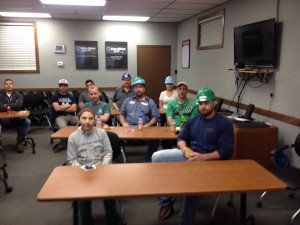
[aesop_quote type=”pull” background=”#282828″ text=”#ffffff” width=”30%” align=”left” size=”2″ quote=”The joint training has been a very positive experience for all parties involved.” cite=”Marvin Spidle, corporate safety manager from the Federal Business Unit at JBS.” parallax=”on” direction=”left”]
“The joint training has been a very positive experience for all parties involved. It has provided some different ways of looking at the hazards in the workplace that most people overlook. I am excited to continue with this training in our facilities and providing our employees a safer environment to work in,” said Marvin Spidle, corporate safety manager from the Federal Business Unit at JBS.
The program began in January, and JBS workers at UFCW Locals 540, 1161, 293, and 435 have already gone through the first phase of the training. During the first phase of the program, workers and staff learned how to identify workplace hazards in their plant. Following the classroom training, participants then walked together through their plant to apply their new knowledge and identify any hazards that they learned about in the training. Some common safety hazards that workers are trained to spot include unguarded shafts and belts, slippery floors, narrow aisles, and unlabeled exposed pipes and electrical wires.
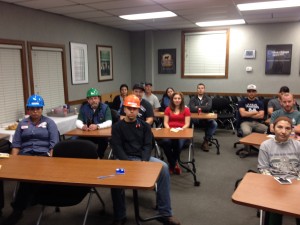 “It was great to see everybody working together in the setting to make our plant safer. During our walk-through, it was good to have a new set of eyes to help spot hazards that might have otherwise been overlooked,” said Darin Rehnelt, a representative for UFCW Local 1161.
“It was great to see everybody working together in the setting to make our plant safer. During our walk-through, it was good to have a new set of eyes to help spot hazards that might have otherwise been overlooked,” said Darin Rehnelt, a representative for UFCW Local 1161.
The trainings last about six hours and are conducted in English and Spanish. Following the JBS plant trainings, the plan is to take the health and safety program to workers in the poultry industry, including those who work in JBS’s Pilgrim’s Pride plants.
If you are interested in having a health and safety training in your local plant contact Kurt Brandt at kbrandt@ufcw.org.
April 28, 2015
We Must Make Workers Memorial Day a Catalyst for Great Change
WASHINGTON, D.C. – Marc Perrone, International President of the United Food and Commercial Workers International Union (UFCW), today released the following statement about Workers Memorial Day:
This Workers Memorial Day, we remember the hard-working men and women who have sacrificed their bodies, and in some cases their lives, to make a living for themselves and their families.
While most Americans may never have heard of this day, the workplace tragedies that inspired it are real and continue to this day. As recently as 2013, 4,400 workers were killed on the job. If we are to end these workplace tragedies, we must work together – unions, corporations, government, and the public – to build a united front that is focused on stopping them.
The best way for Americans to protect themselves is to empower them with laws that protect their right to speak out when they see something unsafe on the job. We must be unafraid to raise the alarm when conditions at their worksite become dangerous.
We must make Workers Memorial Day a catalyst for great change. It is a day to come together and push to pass safe workplace laws that help workers, not protect the irresponsible. Let’s make it easier for workers to be protected in their workplace and bargain for safer standards. Let’s create an environment where corporations view workplace safety as a priority.
Let’s use Workers Memorial Day to inspire us to save the lives that should never be lost.
###
Join the United Food and Commercial Workers International Union (UFCW) online at www.ufcw.org
We are 1.3 million families standing together to build an economy that every hard-working family deserves.
February 11, 2015
UFCW Local 1564 Members Speak Out Against RTW in New Mexico
Click here to watch a video of UFCW Local 1564 members speaking out against right to work in New Mexico.
October 31, 2014
UFCW Applauds OSHA’S Effort to Protect Poultry Workers from Musculoskeletal Disorders, Hazardous Workplace Conditions
 WASHINGTON, D.C. — The United Food and Commercial Workers International Union (UFCW) today released the following statement regarding OSHA’s decision to exercise the seldom-used “general duty clause” of the Occupational Safety and Health Act to protect poultry workers from workplace injuries or death.
WASHINGTON, D.C. — The United Food and Commercial Workers International Union (UFCW) today released the following statement regarding OSHA’s decision to exercise the seldom-used “general duty clause” of the Occupational Safety and Health Act to protect poultry workers from workplace injuries or death.
“The UFCW applauds OSHA’s decision to use the “general duty clause” to protect poultry workers from dangerous workplace conditions, including exposure to unsafe machinery, risk of falling and musculoskeletal hazards. The UFCW also commends OSHA’s efforts to look into practices that result in the failure to manage the medical treatment of injured poultry workers and maintain an accurate record of those injuries, resulting in an artificial injury and illness rate that is used to benefit the poultry industry at the expense of the safety of its workers. The UFCW believes that the safety awards presented by the National Chicken Council and other industry groups to member poultry companies for outstanding safety performance should be reconsidered since OSHA’s findings show that the poultry industry has the ability to conceal the extent to which poultry workers suffer from work-related injuries and illnesses.
“The UFCW represents workers at poultry plants across the country, and our union has called attention to the many dangers poultry workers face every day, including ergonomic health hazards. While the UFCW has been successful in curbing some of the workplace abuses in this industry, too many poultry workers do not have a collective voice on the job and continue to toil in low-wage jobs that threaten their health and safety.
“All poultry workers deserve better workplace conditions, and the UFCW urges OSHA to establish a National Emphasis Program to protect poultry workers from the health and safety hazards that are specific to this industry.”
###
The United Food and Commercial Workers International Union (UFCW) represents more than 1.3 million workers, primarily in the retail and meatpacking, food processing and poultry industries. The UFCW protects the rights of workers and strengthens America’s middle class by fighting for health care reform, living wages, retirement security, safe working conditions and the right to unionize so that working men and women and their families can realize the American Dream. For more information about the UFCW’s effort to protect workers’ rights and strengthen America’s middle class, visit www.ufcw.org, or join our online community at www.facebook.com/UFCWinternational and www.twitter.com/ufcw.
September 23, 2014
National Voter Registration Day
Did you know that in 2008, six million Americans didn’t vote because they missed a registration deadline or didn’t know how to register?
We can’t let that happen again – the 2014 election is just too important to working families. This election will determine whether the Senate and countless state and local governments fight to raise the minimum wage and expand workers’ rights or to bust unions, slash budgets, and cut taxes on the rich. We need to make sure that every UFCW household has its voice heard this year.
Can we count on you? Then register today.
Today is National Voter Registration Day, and our allies at Rock the Vote have created a website with all the information you need to make sure you’re registered.
Forms, key dates, and other voting information are all included.
August 29, 2014
The Way They Worked: UFCW International Secretary-Treasurer Marc Perrone Shares How His Grandparents Shaped His Work Ethic
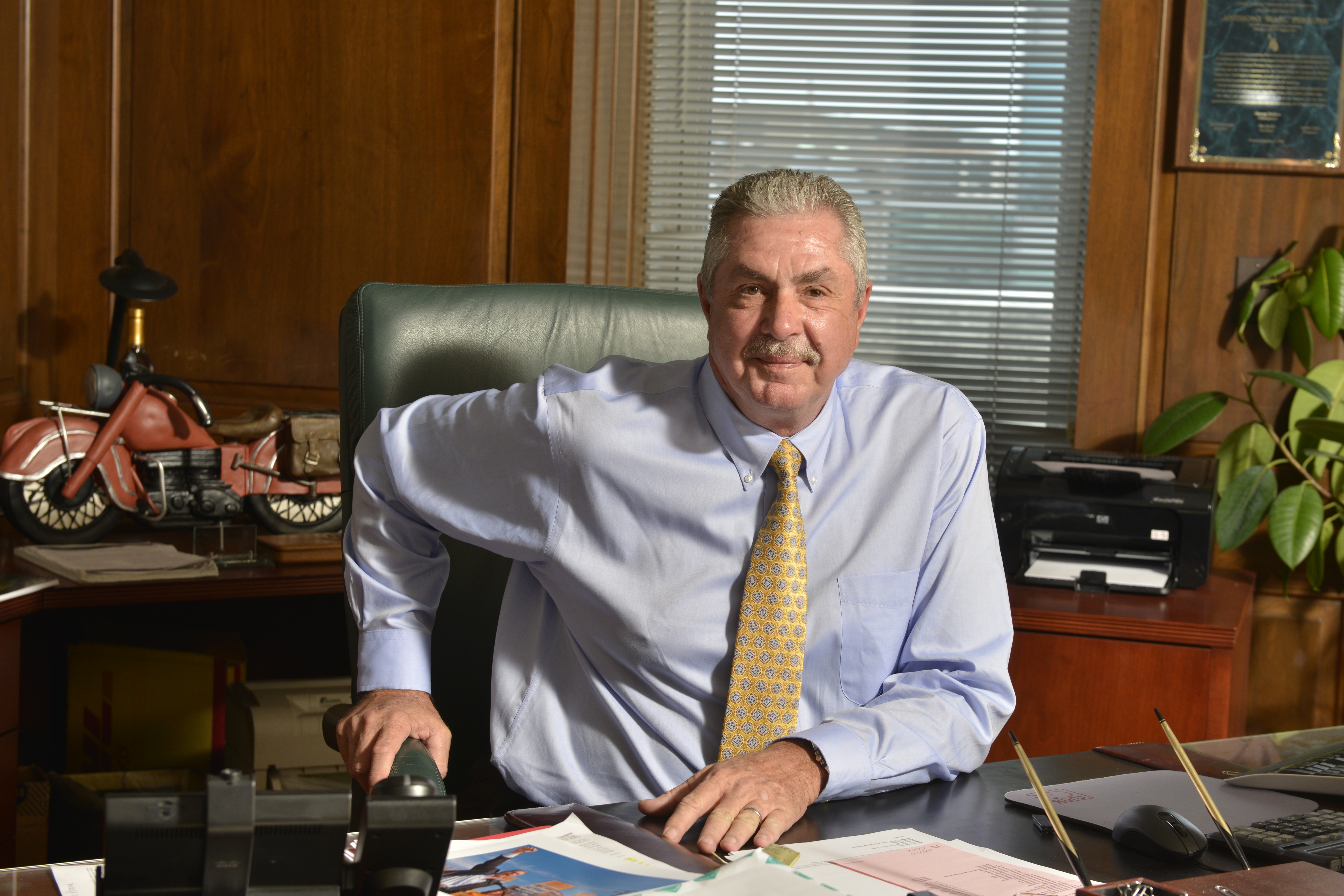 This Labor Day weekend, Jobs with Justice has launched a series of stories called The Way They Worked to collect and share stories from people in the labor movement about how their grandparents worked, and what they learned from them. We sat down with our own UFCW International Secretary-Treasurer Marc Perrone to hear about his grandfather Joe and grandmother Gaetana:
This Labor Day weekend, Jobs with Justice has launched a series of stories called The Way They Worked to collect and share stories from people in the labor movement about how their grandparents worked, and what they learned from them. We sat down with our own UFCW International Secretary-Treasurer Marc Perrone to hear about his grandfather Joe and grandmother Gaetana:
My grandmother arrived in America through the port of New Orleans and my grandfather through Ellis Island, both immigrating from Italy.
Before my grandmother Gaetana met her future husband Joe, she stayed for a while in Louisiana among other Italian immigrants, and her brother worked in the cane fields. Unfortunately, Gaetana’s brother died while working out in the fields one day. The people who employed Gaetana’s brother never notified his family, and buried him in an unmarked grave.
This sad occurrence was just one example of the experiences many immigrant families faced in those times.
Eventually, both of my grandparents and their families moved to Texas where they became sharecroppers and farmers. Joe and Gaetana eventually met and married.
As immigrants, my grandparents and their families experienced a good deal of discrimination. They would always tell me a story, and it has really stuck with me all these years. Before they were sharecroppers, my grandfather and his younger brother had heard that the railroad company was laying track and that there were jobs to clear the land. They walked over to the job-site but were told that since they did not own any tools, they couldn’t get the job. So, my grandfather and his brother walked into town and went to a hardware store. They didn’t have any money, but they talked to the store owner to work out a deal where they could each buy an axe on credit so they could work. Finally, the store owner agreed to the deal and gave them the axes on the condition they pay him back. The brothers then returned to the job-site to talk to the foreman about hiring them, since they now owned the appropriate equipment. However, the foremen simply told them, “we don’t hire Italians here.”
The brothers protested, saying they had been told if they got the tools they could work, but the answer was the same. The brothers were forced to return to the hardware store and return the unused axes, but the store owner refused to take them back, leaving the brothers in debt to him, with no foreseeable way for them to pay him back.
My grandmother Gaetana also had been teased so much about her Italian name in school that she changed her name to Agnes, and was harassed so badly for being an immigrant that she dropped out of school and never learned to read or write.
Despite these hardships, my grandparents worked very hard as sharecroppers and were eventually able to scrape enough money together to buy a plot of land, which they farmed, raising cattle and other farm products. They were up at 5:00 every morning and out the door, checking on the animals, plowing the fields, baling hay, and keeping things going.
The main thing I learned from my grandparents was that if you wanted something in life, you had to work really hard to get it. But if you did that, and respected people, then good things would come to you–and that you could in fact make it, even if you started with nothing.
The other thing I learned, was just how important family was. In addition to working hard on the farm and garden, my grandmother always made sure we had a big traditional Italian Sunday dinner, with home-made spaghetti sauce. And my grandfather always told me, no matter what it was about, I could always come to my family with a problem or if I needed help.
Seeing discrimination and experiencing it themselves, my grandparents were believers in respecting people–treating them fairly and decently, and that had a big impact on me. For many people, families are often your only support system. Today, so many people come to America for a better life, and have to find work and face all kinds of barriers, including discrimination. Many come all by themselves, and their families are far, far away. In these situations, who becomes your support system when you are treated unfairly at work? When workers stick together, that support system is each other. When you are going through the same experiences, or living in worker housing together, people learn to rely on each other and work together to make things better. I think that’s a big part of why I started getting involved in the union.
America’s economy benefits from the hard work and contributions from immigrants, but they are often taken advantage of, discriminated against, or left vulnerable by a lack of protections in the workplace. Both in the days of my grandparents, and today, employers try to drive apart immigrants from different countries or races, or pit them against each other, so that it is harder for them to unite in dealing with issues in the workplace. But when workers stand together they have the power to change things that aren’t right, and even the playing field.
That’s why, as a union, we try to help immigrants however we can–whether it’s creating a path to citizenship, or bargaining for important workplace protections. Your union is truly your family when your support system is far away, and even if it isn’t. When my father died, I had been working for our union, the UFCW, for 33 years. I was walking out of the church from his funeral, and saw the former director who had hired me to work at UFCW coming in. He was over eighty years old, had been retired for 20 years, and had traveled over 100 miles to be there. That really demonstrated to me how union people are your family.
Whether someone is an immigrant or not, unions are avenues and vehicles for people to improve their lives. They are made up of groups of people that provide physical and psychological support, and can be the difference in feeling like you are powerless to change something, to feeling empowered to make a difference.
Tell us about your grandparents’ work story! Send submissions to Submissions@ufcw.org, post on our facebook page, or fill out an online form here.
July 31, 2014
UFCW President Hansen Statement on Final USDA Poultry Modernization Rule
 WASHINGTON, D.C. — Joe Hansen, International President of the United Food and Commercial Workers International Union (UFCW), today released the following statement after the USDA published a final poultry modernization rule.
WASHINGTON, D.C. — Joe Hansen, International President of the United Food and Commercial Workers International Union (UFCW), today released the following statement after the USDA published a final poultry modernization rule.
July 31, 2014
UFCW President Hansen Statement on Final USDA Poultry Modernization Rule
 WASHINGTON, D.C. — Joe Hansen, International President of the United Food and Commercial Workers International Union (UFCW), today released the following statement after the USDA published a final poultry modernization rule.
WASHINGTON, D.C. — Joe Hansen, International President of the United Food and Commercial Workers International Union (UFCW), today released the following statement after the USDA published a final poultry modernization rule.
“For more than two years, UFCW members have spoken out with a simple and compelling message: safe line speeds mean safe workers.
“With today’s publication of an improved poultry modernization rule, it is clear that the voices of UFCW members were heard loud and clear.
“I want to thank our coalition partners in labor, food safety, and the civil rights community for standing side by side with us throughout this process. I want to recognize the Department of Labor for raising important safety questions. And I especially want to commend Secretary Vilsack for listening to our concerns and taking the necessary steps to fix this rule.
“Poultry processing remains a dangerous job; a recent study showed 42 percent of workers in this industry have evidence of carpal tunnel. With this rule behind us, I look forward to working with the Department of Labor and the USDA to make our poultry plants safer and ensure more workers can have a voice on the job.”
###
The United Food and Commercial Workers International Union (UFCW) represents more than 1.3 million workers, primarily in the retail and meatpacking, food processing and poultry industries. The UFCW protects the rights of workers and strengthens America’s middle class by fighting for health care reform, living wages, retirement security, safe working conditions and the right to unionize so that working men and women and their families can realize the American Dream. For more information about the UFCW’s effort to protect workers’ rights and strengthen America’s middle class, visit www.ufcw.org, or join our online community at www.facebook.com/UFCWinternational and www.twitter.com/ufcw.



